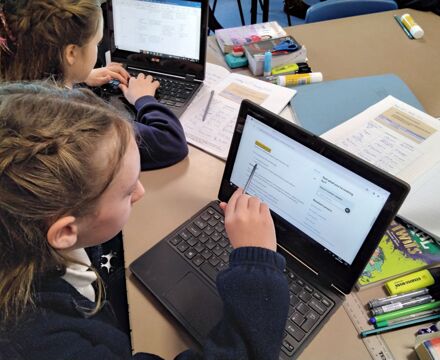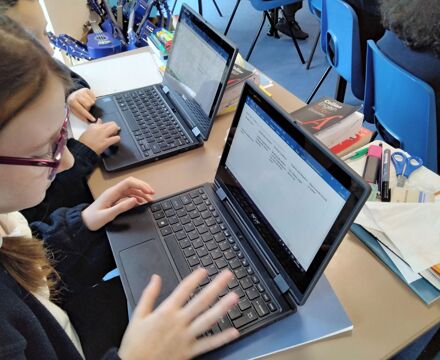Computing
Intent:
In line with our whole school vision, our aim for the computing curriculum is to promote and develop each child’s communication skills. The use of information and communication technology has become an essential part of the way we all work, communicate, collaborate and entertain ourselves. Therefore, it is our aim at Bulford St Leonard’s to equip our children with the skills and knowledge necessary to thrive and participate in a world of rapidly-changing technology.
We enable them to find, explore, analyse, exchange and present information. We also help them develop the necessary skills to evaluate and assess the reliability of information in an effective way. This is a major part of enabling children to be confident, creative and independent learners who understand the importance of staying safe when using technology.
We aim for all pupils to:
- to develop ICT capability in finding, selecting and using information;
- to use ICT for effective and appropriate communication;
- to apply their ICT skills and knowledge to their learning in other areas;
- to understand and apply the key principles of computer science including logic, algorithms and communication;
- to use ICT and technology creatively;
- to analyse problems using ‘computational thinking’ and be able to write programs that solve problems;
- explore their attitudes towards ICT and its value to them and society in general.
- learn about issues of security and personal safety, confidentiality and accuracy.
Understanding the real life applications of the technology used within our Computing curriculum, will support children to visualise their role and future contributions to society, supporting our whole school vision.
Implementation:
We use the KAPOW scheme of work to support our delivery of computing. The scheme is designed with three strands
- Computer science
- Information technology
- Digital literary
The scheme is then organised into five key areas, creating a cyclical route through which pupils can develop their computing knowledge and skills by revisiting and building on previous learning.
- Computer systems and networks
- Programming
- Creating media
- Data handling
- Online safety
The implementation of the KAPOW Computing ensures a broad and balanced coverage of the National Curriculum requirements, and the 'Skills showcase' units provide pupils with the opportunity to learn and apply transferable skills.
Lessons incorporate a range of teaching strategies from independent tasks, paired and group work as well as unplugged and digital activities. This means lessons are engaging and appeal to those with a variety of learning styles. Lessons can be accessed by all pupils and opportunities are provided to stretch pupils' learning when required.
Computing is timetabled weekly for all children and we are lucky enough to have laptops and tablets available for whole class teaching.
Work on E-safety is interwoven throughout each domain and is always revisited at the start of the term. Key aspects of E-safety are applied to the new learning that is going to be taught.
Impact:
The impact of following the KAPOW Computing scheme can be constantly monitored through both formative and summative assessment opportunities. Each lesson include guidance to support in assessing pupils against the objective of the lesson and each unit has a unit quiz which is used at the start and/or end of the unit.
Pupils will leave Bulford St Leonard's equipped with a range of range of skills to enable them to succeed in their secondary education and be active participants in the ever-increasing digital world.
Upon leaving Bulford St Leonard's children will:
- Be critical thinkers, able to understand how to make informed and appropriate digital choices in the future
- Understand the importance that computing will have going forward in both their educational and working life and in their social and personal futures
- Understand how to balance time spent on technology and time spent away from it in a healthy and appropriate manner
- Understand that technology helps to showcase their ideas and creativity. They will know that different types of software and hardware can help them achieve a broad variety of artistic and practical aims
- Show a clear progression of technical skills across all areas of the National curriculum - computer science, information technology and digital literacy
- Be able to use technology both individually and as part of a collaborative team
- Be aware of online safety issues and protocols and be able to deal with any problems in a responsible and appropriate manner
- Have an awareness of developments in technology and have an idea of how current technologies work and relate to one another
- Meet the end of key stage expectations outlined in the National curriculum for Computing
A comprehensive overview of knowledge and skills from the KAPOW scheme of work is available upon request
Websites
As part of our safeguarding procedures, we feel it is important to keep parents and carers up to date with the challenges that technology can present.
Here are some links that contain useful information and guidance for Parents to help using support children to use technology safely:
ChildnetChildline Childnet - advice for parents and carers
UK Safer Internet Centre - Resources for 3-11 year olds
The CEOP website can be used to report any concerns about the way that someone is communicating online with you or your child.
Click here to visit the CEOP website
Netaware have also put together a large list of apps, social media sites and games which have been rated and reviewed in terms of safety of use. With new apps and games coming out every day, it is a great way to keep informed about the types of apps your children are using.






